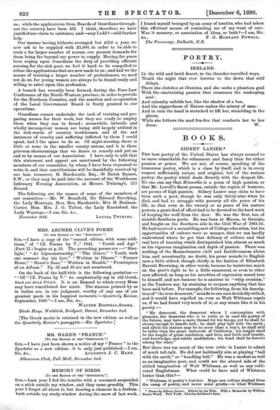THE NURSING OF THE SICK IN WORKHOUSES.
[To THE EDITOR OF THE "SPECTATOR."] SIR,—The condition and management of our• voluntary hospitals has lately been brought prominently before the public, and attention has been, and will be for• some time, directed to the question of their shortcomings. But I venture to ask, how many persons give a thought to the condition of the far larger number of sufferers, who may be reckoned by thousands, in the "State hospitals" of England supported by the rates, and found in every Poor-Law Union throughout the country P We can hardly say that these institutions are out of sight, though but little is known of their• inmates, and it is the condition of these afflicted ones that I now earnestly ask to be allowed to bring before your readers.
In the first place, our workhouse infirmaries and sick-wards may be said to be the sole refuge for the most pitiable of all sufferers, the " incurables," for• whom no place is found in our voluntary hospitals, and the very few institutions that do exist for such cases are not for• the friendless and the desti- tute. Chronic disease and infirmity thus drifts into our workhouses, and it is of the nursing which they receive there that I wish to speak. On looking back for forty, or even twenty years, I may say that no nursing was provided for them ; separate infirmaries did not exist; pauper helps (we cannot call them nurses) were employed to tend them,—men and women who, if sufficiently able-bodied to perform any kind of service, were of the lowest moral character, vicious and drunken, and utterly ignorant of what they were required to do. It was to remedy in some degree such a state of things (which was found to prevail even in some of our large London workhouses), that it was proposed in 1879 to form an Associa- tion for providing trained nurses for such service, inviting Boards of Guardians to apply to it for the needs of their sick poor. I may briefly give the results of this effort by saying that in the eleven years since then, we have been enabled to send out no fewer than 329 trained nurses, and to train for our work 126 probationers, with the small funds entrusted to us ; while the applications from Boards of Guardians through- out the country have been 432. I think, therefore, we have justified our claim to existence, and—may I add P—still further help.
Our income having hitherto averaged but £250 a year, we now ask to be supplied with £1,000, in order to be able to train a far larger number of nurses, our present demands for them being far beyond our power to supply. Having for years been urging upon Guardians the duty of providing efficient nursing for the sick poor, we feel it hard to be compelled to refuse the applications that are now made to us ; and had we the means of training a larger number of probationers, we need not do so, for young women are always to be found ready and willing to enter upon this profession.
A branch has recently been formed, during the Poor-Law Conference of the North-Western province, in order to provide for the Northern Counties, and the sanction and co-operation of the Local Government Board is freely granted to our operations.
Guardians cannot undertake the task of training and pre- paring nurses for their work, but they are ready to employ them when they can be found ; meanwhile, imbecile and wholly incompetent women are being still largely utilised in the sick-wards of country workhouses, and of the sad instances of cruelty and suffering inflicted by them I could speak, had I the space to do so. Of night-nursing, there is little or none in the smaller county unions, and it is these grievous shortcomings that we desire to remedy and put an end to by means of our Association. I have only to add that this statement and appeal are sanctioned by the following members of our committee, by whom I have been requested to write it, and that contributions will be thankfully received by our hen. treasurer, H. Hardcastle, Esq., 38 Eaton Square, S.W., or they may be paid into the account of the Workhouse Infirmary Nursing Association, at Messrs. Twining's, 215 Strand.
The following are the names of some of the members of our committee :—Hr. W. Bousfield, Sir Edward Sieveking, the Lady Montagu, Hon. Mrs. Hardoastle, Mrs. H. Bonham- Carter, Hon. Mrs. J. G. Talbot, the Lady Knutsford, the Lady Wantage.—I am, Sir, &c.,
November 20th. LOUISA TWINING.























































 Previous page
Previous page